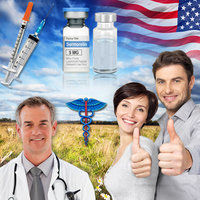Introduction to Primary Hypogonadism
Primary hypogonadism, also known as testicular failure, is a condition where the testes do not produce sufficient levels of testosterone, the primary male sex hormone. This can lead to a variety of symptoms including decreased libido, erectile dysfunction, fatigue, and mood disturbances. For American males, understanding and managing this condition is crucial for maintaining quality of life and overall health.
The Importance of Education in Managing Primary Hypogonadism
Education plays a pivotal role in the effective management of primary hypogonadism. Knowledge about the condition, its symptoms, and treatment options empowers patients to take an active role in their healthcare. For American males, this is particularly important as cultural attitudes towards health and masculinity can sometimes hinder open discussions about such conditions.
Symptoms and Diagnosis
Recognizing the symptoms of primary hypogonadism is the first step towards effective management. Common symptoms include reduced sexual desire, infertility, muscle loss, and increased body fat. Diagnosis typically involves a thorough medical history, physical examination, and blood tests to measure testosterone levels. American males should be encouraged to seek medical advice if they experience these symptoms, as early diagnosis can lead to more effective treatment outcomes.
Treatment Options
Treatment for primary hypogonadism primarily involves testosterone replacement therapy (TRT). This can be administered through injections, gels, patches, or pellets. The goal of TRT is to restore testosterone levels to normal, thereby alleviating symptoms and improving quality of life. It is essential for patients to work closely with their healthcare providers to monitor hormone levels and adjust treatment as necessary.
Lifestyle Modifications
In addition to medical treatment, lifestyle modifications can play a significant role in managing primary hypogonadism. Regular exercise, a balanced diet, and adequate sleep can help improve overall health and enhance the effectiveness of TRT. American males should be educated on the importance of these lifestyle factors and encouraged to incorporate them into their daily routines.
Psychological Support
The psychological impact of primary hypogonadism should not be underestimated. Conditions such as depression and anxiety can be exacerbated by hormonal imbalances. American males should be encouraged to seek psychological support if needed. Counseling and support groups can provide valuable resources for coping with the emotional aspects of the condition.
The Role of Healthcare Providers
Healthcare providers play a crucial role in educating American males about primary hypogonadism. They should provide clear, comprehensive information about the condition, its management, and the importance of adherence to treatment plans. Regular follow-up appointments are essential to monitor progress and make necessary adjustments to treatment.
Community and Cultural Considerations
Cultural attitudes towards masculinity and health can influence how American males perceive and manage primary hypogonadism. Education efforts should be tailored to address these cultural nuances, promoting a more open and supportive environment for discussing health issues. Community health programs and awareness campaigns can help break down stigma and encourage more men to seek help.
Conclusion
Primary hypogonadism is a manageable condition, but effective management requires a comprehensive approach that includes education, medical treatment, lifestyle modifications, and psychological support. For American males, understanding the importance of these elements can lead to better health outcomes and an improved quality of life. By fostering a culture of openness and support, we can empower men to take control of their health and well-being.
Contact Us For A Fast And Professional Response

- Primary Hypogonadism in American Males: Overcoming Stigma and Enhancing Treatment [Last Updated On: March 15th, 2025] [Originally Added On: March 15th, 2025]
- Primary Hypogonadism in Aging Men: Symptoms, Diagnosis, and Treatment Options [Last Updated On: March 17th, 2025] [Originally Added On: March 17th, 2025]
- Managing Primary Hypogonadism and Diabetes: Challenges and Strategies for American Men [Last Updated On: March 18th, 2025] [Originally Added On: March 18th, 2025]
- Primary Hypogonadism and Obesity Link: Impact and Management in American Men [Last Updated On: March 18th, 2025] [Originally Added On: March 18th, 2025]
- Primary Hypogonadism: Symptoms, Diagnosis, and Advocacy for American Men's Health [Last Updated On: March 18th, 2025] [Originally Added On: March 18th, 2025]
- Managing Primary Hypogonadism: Nutritional Strategies to Boost Testosterone in American Males [Last Updated On: March 19th, 2025] [Originally Added On: March 19th, 2025]
- Exercise Strategies for Managing Primary Hypogonadism in American Males [Last Updated On: March 19th, 2025] [Originally Added On: March 19th, 2025]
- Primary Hypogonadism: Impact, Diagnosis, and Management Strategies for American Men [Last Updated On: March 19th, 2025] [Originally Added On: March 19th, 2025]
- Primary Hypogonadism: Support Networks Crucial for Emotional and Treatment Guidance [Last Updated On: March 19th, 2025] [Originally Added On: March 19th, 2025]
- Innovative Therapies Transforming Primary Hypogonadism Treatment in American Males [Last Updated On: March 20th, 2025] [Originally Added On: March 20th, 2025]
- Primary Hypogonadism and Sleep: Impacts and Management Strategies for American Men [Last Updated On: March 20th, 2025] [Originally Added On: March 20th, 2025]
- Primary Hypogonadism in American Males: Current Treatments and Future Innovations [Last Updated On: March 21st, 2025] [Originally Added On: March 21st, 2025]
- Managing Primary Hypogonadism: Importance of Regular Check-ups for American Males [Last Updated On: March 21st, 2025] [Originally Added On: March 21st, 2025]
- Navigating the Emotional Journey of Primary Hypogonadism in American Males [Last Updated On: March 22nd, 2025] [Originally Added On: March 22nd, 2025]
- Navigating Primary Hypogonadism: Diagnosis, Treatment, and Healthcare Advocacy in the U.S. [Last Updated On: March 22nd, 2025] [Originally Added On: March 22nd, 2025]
- Primary Hypogonadism: Impact on Work and Strategies for Productivity in American Men [Last Updated On: March 22nd, 2025] [Originally Added On: March 22nd, 2025]
- American Males' Resilience and Strength with Primary Hypogonadism: Personal Stories and Support [Last Updated On: March 23rd, 2025] [Originally Added On: March 23rd, 2025]
- Primary Hypogonadism: Causes, Symptoms, and Treatment for American Men's Health [Last Updated On: March 23rd, 2025] [Originally Added On: March 23rd, 2025]
- Primary Hypogonadism's Impact on Muscle Mass in American Males: Mechanisms and Interventions [Last Updated On: March 23rd, 2025] [Originally Added On: March 23rd, 2025]
- Primary Hypogonadism: Understanding, Diagnosing, and Treating Testicular Failure in American Men [Last Updated On: March 23rd, 2025] [Originally Added On: March 23rd, 2025]
- Primary Hypogonadism: Symptoms, Diagnosis, and Management in American Men [Last Updated On: March 23rd, 2025] [Originally Added On: March 23rd, 2025]
- Primary Hypogonadism in American Men: Causes, Diagnosis, and Holistic Management Strategies [Last Updated On: March 24th, 2025] [Originally Added On: March 24th, 2025]
- Primary Hypogonadism: Impact on American Men's Social Life and Well-being [Last Updated On: March 24th, 2025] [Originally Added On: March 24th, 2025]
- Primary Hypogonadism in American Males: Causes, Impacts, and Management Strategies [Last Updated On: March 24th, 2025] [Originally Added On: March 24th, 2025]
- Primary Hypogonadism: Causes, Symptoms, and Treatment Options for American Men [Last Updated On: March 24th, 2025] [Originally Added On: March 24th, 2025]
- Primary Hypogonadism: Diagnosis, Impact, and Management in American Men [Last Updated On: March 24th, 2025] [Originally Added On: March 24th, 2025]
- Managing Primary Hypogonadism: Testosterone Therapy and Lifestyle Strategies for American Men [Last Updated On: March 24th, 2025] [Originally Added On: March 24th, 2025]
- Primary Hypogonadism: Impacts on Body Image and Holistic Management Strategies [Last Updated On: March 24th, 2025] [Originally Added On: March 24th, 2025]
- Primary Hypogonadism in American Males: The Vital Role of Family Support [Last Updated On: March 25th, 2025] [Originally Added On: March 25th, 2025]
- Community Support Enhances Life for Men with Primary Hypogonadism [Last Updated On: March 25th, 2025] [Originally Added On: March 25th, 2025]
- Primary Hypogonadism's Emotional Impact on American Males: Diagnosis, Treatment, and Support [Last Updated On: March 25th, 2025] [Originally Added On: March 25th, 2025]
- Genetic Testing for Primary Hypogonadism: Diagnosis and Management in American Males [Last Updated On: March 25th, 2025] [Originally Added On: March 25th, 2025]
- Primary Hypogonadism's Impact on Physical Activity in American Males [Last Updated On: March 25th, 2025] [Originally Added On: March 25th, 2025]
- Economic Impact of Primary Hypogonadism on American Men: Costs and Management Strategies [Last Updated On: March 26th, 2025] [Originally Added On: March 26th, 2025]
- Primary Hypogonadism: Advocacy and Research Needs for American Men's Health [Last Updated On: March 26th, 2025] [Originally Added On: March 26th, 2025]
- Primary Hypogonadism's Impact on Self-Esteem in American Males: Awareness and Treatment [Last Updated On: March 26th, 2025] [Originally Added On: March 26th, 2025]
- Nutritionists' Vital Role in Managing Primary Hypogonadism in American Males [Last Updated On: March 26th, 2025] [Originally Added On: March 26th, 2025]
- Primary Hypogonadism: Symptoms, Early Intervention, and Treatment Options for American Men [Last Updated On: March 26th, 2025] [Originally Added On: March 26th, 2025]
- Primary Hypogonadism in American Men: The Vital Role of Peer Support [Last Updated On: March 26th, 2025] [Originally Added On: March 26th, 2025]
- Primary Hypogonadism: Symptoms, Diagnosis, and Management in the U.S. Healthcare System [Last Updated On: March 26th, 2025] [Originally Added On: March 26th, 2025]
- Primary Hypogonadism: Diagnosis, Specialists, and Treatment for American Men [Last Updated On: March 27th, 2025] [Originally Added On: March 27th, 2025]
- Diagnosing Primary Hypogonadism in American Males: Challenges and Solutions [Last Updated On: March 27th, 2025] [Originally Added On: March 27th, 2025]
- Primary Hypogonadism: Impacts on American Males' Careers and Strategies for Resilience [Last Updated On: March 27th, 2025] [Originally Added On: March 27th, 2025]
- Primary Hypogonadism in American Males: Symptoms, Effects, and Management Strategies [Last Updated On: March 27th, 2025] [Originally Added On: March 27th, 2025]
- Managing Primary Hypogonadism in American Men: Diagnosis, Treatment, and Lifestyle Strategies [Last Updated On: March 27th, 2025] [Originally Added On: March 27th, 2025]
- Primary Hypogonadism: Understanding Treatments and Managing Side Effects in American Males [Last Updated On: March 27th, 2025] [Originally Added On: March 27th, 2025]
- Primary Hypogonadism: Impact on Mental Health and Role of Professionals [Last Updated On: March 27th, 2025] [Originally Added On: March 27th, 2025]
- Primary Hypogonadism in American Men: Prevalence, Management, and Future Research [Last Updated On: March 28th, 2025] [Originally Added On: March 28th, 2025]
- Primary Hypogonadism: Emotional Support Strategies for American Men [Last Updated On: March 29th, 2025] [Originally Added On: March 29th, 2025]
- Primary Hypogonadism: Challenges and Solutions in Male Family Planning [Last Updated On: March 30th, 2025] [Originally Added On: March 30th, 2025]
- Exercise Physiologists' Role in Managing Primary Hypogonadism in American Males [Last Updated On: March 30th, 2025] [Originally Added On: March 30th, 2025]
- Managing Primary Hypogonadism: Lifestyle Strategies for American Men's Health [Last Updated On: April 2nd, 2025] [Originally Added On: April 2nd, 2025]
- Managing Primary Hypogonadism: Strategies for Stress and Anxiety in American Men [Last Updated On: April 2nd, 2025] [Originally Added On: April 2nd, 2025]
- Endocrinologists' Vital Role in Managing Primary Hypogonadism in American Males [Last Updated On: April 3rd, 2025] [Originally Added On: April 3rd, 2025]
- Overcoming Psychological Barriers to Primary Hypogonadism Treatment in American Males [Last Updated On: April 3rd, 2025] [Originally Added On: April 3rd, 2025]
- Managing Primary Hypogonadism: Financial Assistance Options for American Men [Last Updated On: April 6th, 2025] [Originally Added On: April 6th, 2025]
- Primary Hypogonadism: Impacts on Social Connections and Strategies for Support [Last Updated On: April 8th, 2025] [Originally Added On: April 8th, 2025]
- Managing Primary Hypogonadism: Education's Role in American Males' Health [Last Updated On: April 9th, 2025] [Originally Added On: April 9th, 2025]
- Support Groups: Vital for American Males with Primary Hypogonadism [Last Updated On: April 9th, 2025] [Originally Added On: April 9th, 2025]
- Managing Primary Hypogonadism in American Men: A Multidisciplinary Approach [Last Updated On: April 9th, 2025] [Originally Added On: April 9th, 2025]
- Managing Primary Hypogonadism: Symptoms, Diagnosis, and Treatment for American Men [Last Updated On: April 9th, 2025] [Originally Added On: April 9th, 2025]
- Technology Revolutionizes Primary Hypogonadism Management in American Men [Last Updated On: April 10th, 2025] [Originally Added On: April 10th, 2025]
- Primary Hypogonadism: Diagnosis, Treatment, and Lifestyle Management for American Men [Last Updated On: April 11th, 2025] [Originally Added On: April 11th, 2025]
- Primary Hypogonadism: Understanding, Managing, and Thriving for American Men [Last Updated On: April 12th, 2025] [Originally Added On: April 12th, 2025]
- Managing Primary Hypogonadism: Challenges and Strategies for American Males [Last Updated On: April 12th, 2025] [Originally Added On: April 12th, 2025]
- Mental Health Apps: A Vital Support for American Males with Primary Hypogonadism [Last Updated On: April 13th, 2025] [Originally Added On: April 13th, 2025]
- Primary Hypogonadism: Symptoms, Causes, and Management Strategies for American Males [Last Updated On: April 13th, 2025] [Originally Added On: April 13th, 2025]
- Primary Hypogonadism: Workplace Challenges and Advocacy Strategies for American Men [Last Updated On: April 15th, 2025] [Originally Added On: April 15th, 2025]
- Primary Hypogonadism's Impact on American Men's Hobbies and Leisure Activities [Last Updated On: April 15th, 2025] [Originally Added On: April 15th, 2025]
- Managing Primary Hypogonadism: Preparing for Doctor Visits and Treatment Options [Last Updated On: April 15th, 2025] [Originally Added On: April 15th, 2025]
- Primary Hypogonadism's Impact on American Males' Education: Challenges and Solutions [Last Updated On: April 16th, 2025] [Originally Added On: April 16th, 2025]
- Managing Primary Hypogonadism: The Crucial Role of Regular Follow-Ups in Men's Health [Last Updated On: April 17th, 2025] [Originally Added On: April 17th, 2025]
- Physical Therapy's Role in Managing Primary Hypogonadism in American Males [Last Updated On: April 18th, 2025] [Originally Added On: April 18th, 2025]
- Managing Primary Hypogonadism: Building Your Comprehensive Healthcare Team [Last Updated On: April 18th, 2025] [Originally Added On: April 18th, 2025]
- Managing Primary Hypogonadism: Personalized Care for American Men's Health [Last Updated On: April 19th, 2025] [Originally Added On: April 19th, 2025]
- Traveling with Primary Hypogonadism: Challenges and Management Strategies for American Males [Last Updated On: April 19th, 2025] [Originally Added On: April 19th, 2025]
- Dietitians' Role in Managing Primary Hypogonadism in American Males Through Nutrition [Last Updated On: April 19th, 2025] [Originally Added On: April 19th, 2025]

















